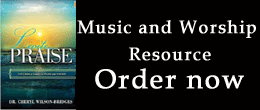|
|
|
|

Musical praise and worship play a crucial role in the majority of Christian church services around the world, but while nearly everyone is in agreement regarding it's importance, there is significantly less unity of opinion with regard to how it should be carried out. Levite Praise delves deeply in to the Scriptures to help worship leaders and worshipers devleop a full understanding of what it means to direct and take part in God's perfect model for praise and worship.
| |
|
|
 Editorial Editorial 
|  | | |  Christ-centered Adventist Worship Part II: A Copernican RevolutionBy Nicholas Zork In a previous editorial I made a fervent appeal for worship that is both distinctively Adventist and radically Christ-centered - worship in which Jesus truly has "first place in everything" (Col 1:18). But can we experience such worship renewal by simply tinkering with current approaches? Or, do we need a Copernican revolution? In 1543, Nicolaus Copernicus published De Revolutionibus Orbium Coelestium (On the Revolutions of the Celestial Spheres), in which he made a now-obvious but then audacious claim: the earth is not the center of the universe. It's well documented how warmly his thesis was embraced. There were two primary obstacles: first, his proposal contradicted established teaching and intuition (i.e., the sun appears to rise); and second, he asserted something we still find difficult to accept: the universe doesn't revolve around us. Adventist identity is grounded in a mission to tell the world about Christ's return. But are we stifled at times by similarly misguided us-centered assumptions? Do our discourse and actions fully reflect the fact that the universe revolves, not around us, but around the Son of God, in whom "all things hold together" (Col 1:17)? In even our worship of God, have we elevated the messenger above the message, our words above the Living Word? A God-focused, Jesus-centered, "Copernican" revolution in worship must involve at least three characteristics (there are, of course, others): 1. God's story (who God is; and what God has done, is doing and will do) becomes primary. God's Word to us is privileged over our words to God. Our responses, stories and experiences are, then, interwoven into a Christ-centered cosmic narrative that transcends yet graciously embraces us. This prioritization of the "vertical" over the "horizontal" doesn't mean that we lose concern for one another. Quite the opposite! As Christ-centeredness supplants self-centeredness, we become able by grace to truly love other people - within and beyond our Adventist Christian community. 2. Christ is always preached. Ellen White's counsel should be taken seriously: "The sacrifice of Christ as an atonement for sin is the great truth around which all other truths cluster. In order to be rightly understood and appreciated, every truth in the Word of God, from Genesis to Revelation, must be studied in the light that streams from the cross of Calvary." (Evangelism, 190) Perhaps this is what Paul is getting at when he writes, "I determined to know nothing among you except Jesus Christ, and Him crucified" (1 Cor. 2:2). Does our preaching measure up this total Christ-centeredness? 3. Our worship planning and leading is intended first and foremost to point people to Christ, the true worship leader. Jesus promises us that if we lift Him up, He will draw all humankind to Himself (John 12:32). Our prayers, songs of praise, and sermons cannot lead people into the presence of the Living God. True worship only happens when Christ is lifted up and He enables an encounter that transforms our lives and this world. Such a Son-of-God-centered "Copernican" revolution will never result from mere human will or effort. But as we acknowledge Christ's supremacy, God can graciously draw our worship into orbit around the only One who belongs at its center.  Discuss this article on Facebook Discuss this article on Facebook
| |
 Featured Media Featured Media 
|  | | |
Music and Worship Conference Videos Online
Two additional presentations from the 2011 Andrews University Music and Worship Conference, a Vervent Adventist Worship Conference, are now online.
 "Preach the Word" was delivered by Dr. Hyveth Williams at the Andrews University Music and Worship conference. March 24-26, 2011. "Preach the Word" was delivered by Dr. Hyveth Williams at the Andrews University Music and Worship conference. March 24-26, 2011.
Hyveth Williams is professor of Homiletics at the Seventh-day Adventist Theological Seminary at Andrews University, Michigan. She served for thirteen-and-a-half years as Senior Pastor of Campus Hill Church in Loma Linda, California. She is the first black female pastor and the first female Senior Pastor in the Seventh-day Adventist denomination.
 "Worship Life" was delivered by Eddie Hypolite at the Andrews University Music and Worship conference, March 24-26, 2011. "Worship Life" was delivered by Eddie Hypolite at the Andrews University Music and Worship conference, March 24-26, 2011.
Eddie Hypolite is a pastor, educational consultant and motivational speaker. He travels internationally, preaching and teaching in the areas of urban ministry, leadership, and youth & street culture. His vocational background is originally in the area of residential social work. He presently serves as director of Teens and Chaplaincy ministry at the South England Conference of Seventh-day Adventists.
| |
 Worship Theology Worship Theology 
|  | | |  "But solid food is for the mature, who because of practice have their senses trained to discern good and evil." Hebrews 5:14 If I had to sum up the structure of what worship is, I would say that to worship is to acknowledge the reality of God. This simple definition highlights a subjective element in worship, namely, the individual who acknowledges this reality through different ways (music, prayer, thanksgiving, etc.), as well as an objective element, namely, the reality of God. If that which I seek as a worshipper of the true God is to worship Him in Spirit and truth, then, I must go to the Bible not only looking for what was done right, but to reflect on that which was also done wrong. But to understand the theological foundations of counterfeit worship, I must begin with a brief introduction into the biblical portrayal of "discernment." At the center of Hebrew faith and religion is the ability of the human being to "understand" (the Hebrew word binah). Proverbs 9:10 and Daniel 1:20, for example, use the word "understanding" interchangeably with "wisdom." In other words, to be wise is to understand. Interestingly, binah ("to understand") comes from the Hebrew word bein or "between." The idea behind "understanding" in the Bible is that the one who is wise, the one who understands, is the one who has ability to discern "between" good and evil, between real and unreal, between original and fake. This ability to "understand" or to "be wise" by discernment is a crucial element of worship. If we are, as worshippers, to acknowledge the reality of God, part of this task is to have the ability to discern His real presence in our midst, or else we might fall into a common temptation in worship and spirituality today which ends up worshipping an "idea of God" rather than the "reality of God" Himself. For this reason, to worship is, in many ways, to discern. [To continue this article, click here]  Finish this article on Facebook Finish this article on Facebook
| |
 Worship Evangelism Worship Evangelism 
|  | | |
Curious guests walk into your church every week. Some are believers that are just curious about your church; they've heard about your pastor or the worship band or the children's ministry and want to try it on for size. The other group of curious guests is what I REALLY get excited about though; they're either apathetic or agnostic and have heard or seen something different about your church that has drawn them to walk through your doors. Do you think about these guests when you create and lead worship experiences? How important is their experience to you? Let me tell you why they should be an important consideration in creating and leading your worship experiences. It is my belief that the church has two callings: first, to grow and disciple believers in their lifelong relationship with Jesus; and second, to make disciples by introducing them to Jesus and inviting them into a relationship with Him. Both are really important jobs, but many of us are putting so much energy into the first calling that we're ignoring the second. In His ministry on earth, Jesus made a big deal about those considered "outsiders." He said that when we serve these people, we are serving Him. And in His last instruction to His followers, He said to go and share the good news with all people. Reaching those that don't know Him is a big deal to Jesus - so we need to make it a big deal in our worship! Believe it or not, in our corporate worship gatherings we have an opportunity to reach both groups. Here's how you can move in that direction... - Use artistic expressions well. I've said it before and I'll say it again...if you can't do it well, you can't be credible. Whether its graphics, music or dance... it has to be inspiring, even to skeptics!
- Cast the vision for your team. They need to understand that you're not just trying to lead a congregation of believers to the throne of God, you're also trying to lead people into His grace for the first time. That means as we create and lead people through worship experiences, we allow them to engage at their own comfort level. We can't call them out, force anything out of them or expect any particular response.
- Lead by example. Focus on your personal worship experience as you lead worship. Be genuinely engaged in worship as a conversation between you and God. As you model worship for the attendees, they will be more willing to engage.
- Ask for a heart for those who don't believe. Pray that God inspires you with a heart for those Jesus-curious guests that come to your church. As God inspires you with a burden to invite "outsiders" in, you'll be better equipped to serve them in worship.
www.rickandersonworship.com | |
 Worship Leading Worship Leading 
|  | | |
No matter how much we plan for worship, it's inevitable that details will get overlooked, commitments will go unmet, and new needs will arise. Upcoming worship services are, for better or worse, not fixed entities. They continue changing, becoming what they will be until the final benediction - and perhaps beyond! A capacity for Sprit-led improvisation is a spiritual gift of great liturgical value. But the fact that improvisation is often necessary makes preparation more, not less important. Here are three specific things to consider: 1. Spiritually and pastorally sensitive worship leaders will sometimes realize during a service that songs need to be dropped, added or changed. Worship is our response to God. And the God of Scripture is as unpredictable as He is reliable. Additionally, our prepared worship songs may not be effectively facilitating God-focused participation in the way we intended, requiring adjustments. Any accomplished musical improviser, however, will tell you that improvisation is not an act of creation ex nihilo ("out of nothing") but a recombination of things that have been practiced countless times. In a worship setting, we'll be similarly most ready to improvise in response to God and the needs of worshipers if we are well-rehearsed - if we're departing from and reshaping what was prepared. 2. Preparation engenders excellence. And he purpose of excellence in worship is not to impress, receive accolades or even inspire. The purpose of excellence is to go unnoticed. Unnecessary sloppiness draws attention to itself. Excellent worship music allows people to worship through it. It gets out of the way. Messy music is like a dirty window - you see the window. Meticulously prepared music is like a clean window - you see through it to what or who is on the other side. Preparation enables us to lead music through which people can see Christ as we lift Him up. 3. We need to practice the presence of God. We should prepare for worship ministry by worshiping every day on our own. We can't lead people somewhere we haven't been. Fortunately, the Holy Spirit works seven days a week, not just on Sabbath morning. Preparation of musical and other details is essential, but preparation of the heart is paramount. Effective worship leading is, like worship itself, only possible by grace. And we can best prepare to minister by grace on Sabbath morning by daily practicing the gracious presence of God. | |
 Worship Resources Worship Resources 
|  | | |
Worship Sermon Manuscript and PPT Slides  Why should I join the crowd? is a sermon giving the overview of corporate worship. This sermon written by J. David Newman, Senior Pastor of New Hope Adventist Church in Fulton Maryland. Why should I join the crowd? is a sermon giving the overview of corporate worship. This sermon written by J. David Newman, Senior Pastor of New Hope Adventist Church in Fulton Maryland.  The sermon can be used as a stand alone or part of a series on the eight characteristics of Natural Church Development. The sermon can be used as a stand alone or part of a series on the eight characteristics of Natural Church Development.
Each of the components can be downloaded by clicking the adjacent photos. The pdf manuscript can be printed out and has slide thumbnails to help the techie know when to switfch the slides. The doc is fully editable to enable the preacher to place his/her own illustrations. The PowerPoint file is also fully editable and comes with a nice background template.  These slides are courtesy of the Pastors' DVD produced by the North American Division of Seventh-day Adventists. These slides are courtesy of the Pastors' DVD produced by the North American Division of Seventh-day Adventists.
| |
 To the Point To the Point 
|  | | |
"The sacrifice of Christ as an atonement for sin is the great truth around which all other truths cluster. In order to be rightly understood and appreciated, every truth in the Word of God, from Genesis to Revelation, must be studied in the light that streams from the cross of Calvary."
Ellen White, Evangelism, 190
"[I]t is, I believe, poetry, art and music which relate us most directly to that in being which is not ours."
George Steiner
"Then as you meet from Sabbath to Sabbath, sing praises to Him who has called you out of darkness into His marvelous light. 'Unto Him that loved us, and washed us from our sins in His own blood' let the heart's adoration be given. Let the love of Christ be the burden of the speaker's utterance. Let it be expressed in simple language in every song of praise."
Ellen White, Testimonies for the Church , 6:367
| |
 Publishing Information Publishing Information |  | | | Best Practices for Adventist Worship is a Vervent publication of the NAD Church Resource Center. Editor: Nicholas Zork (email). You may republish pieces from Best Practices in your own newsletter or blog, with attribution to the Best Practices for Adventist Worship newsletter and the author. Permission should also be secured from the author.
We welcome your feedback and ideas.
| |
|
|
|
|
|
|